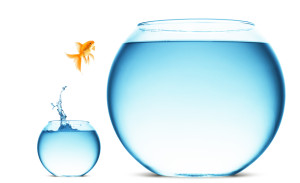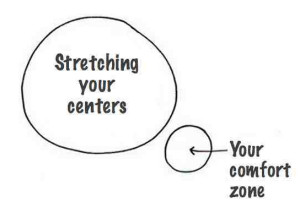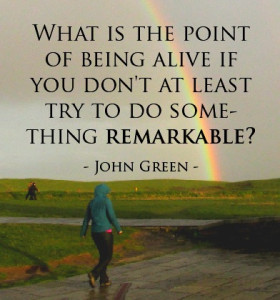
How do you think about risk? Do images of hang gliding or dying on Mount Everest come to mind? Does it mean an activity where one false move can mean death for you? The truth is risk doesn’t need to involve danger. Risk can also be defined as the intentional interaction with uncertainty. “Uncertainty is a potential, unpredictable, unmeasurable and uncontrollable outcome; risk is a consequence of action taken in spite of uncertainty” says Wikipedia. Risk can be defined as “activities with uncertain outcomes.”
The ability to take calculated risks is an essential human trait, crucial to our development. Our risk-taking ancestors were the successful survivors who took chances to adapt to their changing environment. And today, the same principle applies, “To grow, we need to experience challenges — whether we’re 4, 14, or 40” says psychologist Michael Ungar. I’d add–until our dying breath.
Facing things that make us uncomfortable has advantages, whether we succeed or fail: we become more emotionally resilient, confident, satisfied, and engaged with life. We don’t have to parachute from a plane (thank God!) to reap the benefits of taking risks. Choosing to be creative everyday means taking some risk. Any time we pay attention to areas of our life that feel challenging, lacking or intriguing to us– we can choose to take some risk. Whether that means being open to the universe to find a new mate after a divorce or to change our artistic medium in order to better express ourselves on an easel. We embrace the adventure of uncertainty. “Do one thing every day that scares you,” Eleanor Roosevelt said.
Will taking a risk cause anxiety? Yes!
Researcher Hans Selye found there are actually two kinds of stress: Distress is a negative stress and eustress is a positive stress. “Eustress,” or healthy anxiety motivates or focuses our energy. Healthy anxiety is “just right” anxiety; the kind we need to be creative. Too much anxiety becomes toxic to our performance, paralyzing it. Too little anxiety is toxic as well, as it puts us in an “I’m bored” state. So the level of risk we choose to take should include “just right” anxiety for us. This will look different for you than it does for me, but for both of us, it will involve a “stretch” from our head, heart or gut center (or all three).
Pioneer Danish philosopher, and father of existentialism, Søren Kierkegaard explains in his 1844 treatise that anxiety is the dizzying effect of freedom, of paralyzing possibility, of the boundlessness of one’s own existence. He writes, “Anxiety is altogether different from fear and similar concepts that refer to something definite, whereas anxiety is freedom’s actuality as the possibility of possibility.”

We intuitively know that our best learning occurs just beyond our comfort zone from our heart, head or gut perspective. That’s what happened to me when I left my corporate job after 19 years. I had to take a big risk, relinquish the golden handcuffs, and take a leap of faith into the deep unknown. Through the process I discovered more passions: living off the grid in the mountains, building a rustic cabin, trail running on old mining paths and meeting my soul mate whom I would marry. There is always a sense of satisfaction that emerges from trying something entirely new and proving ourselves to be capable of the task. Creativity is born!
Perhaps the coolest benefit of taking a risk is that it’s simply fun. Neuroscientists explain this bliss with biochemistry: New, challenging, and risky activities trigger the release of dopamine, a feel-good neurotransmitter that’s part of the brain’s reward system. Call risk taking the ultimate antidote to boredom. It’s the best way (I am aware of) to wake up and feel fully alive. We can have a say in our destiny—by taking a risk– versus being dominated by our circumstances. Indeed every chance we take teaches us something about ourselves and leads us mysteriously along our long term creative path.
Any risks you’ve taken you’d like to share– that reaped you benefits? Happy risk taking.
Thank you for reading my post. I am an organizational and business consultant living in the mountains of Santa Fe, New Mexico with my husband and dogs. I enjoy hiking and high desert gardening. My core message of everyone is creative resonates with people of all ages and walks of life. I invite all to become the best version of themselves and find true meaning by pursing long term creative quests.
Read more in my book: The Three Sources of Creativity: Breakthroughs from Your Head, Heart and Gut





A quote I have carried in my heart for decades: “If you want to feel truly alive, spend a part of your time stretching and reaching for new things.” Your blog spoke to me Betsy, becoz as I get older I tend to worry more about smaller things. Also, as an engineer, i think risk should be a calculated risk. As Jesus said “Count the cost first.” Excessive risk and you are a loose cannon. Too little risk and we just mechanically drifting through life. I will try to share your blog w my FB friends.
Yes well stated Ian, risks should always be calculated first. I think we should use all three centers of intelligence to calculate the risk, which I am not sure we usually do. When I built my cabin in the mountains in the middle of no where there was no roads, water or electricity. My head said– NO you’d be crazy to try this, you are risking everything. But my heart and gut said, YES, DO IT! It is so breathtakingly beautiful and peaceful (the land was calling me). These 2 centers said it is worth your time, money and the risk. Thankfully, the well I drilled had water! Without water I’m not sure I would have gone forward. I am so glad that my heart and gut intersected together to overcome the severe doubts and negativity of my head!
Immediate compliment….. I love the illustration of the gold fish to make your point! With the number of people/industries interested in creativity, I think you should do well. I will have more to say after I dig in more. Did you research Einstein’s quotes on the subject, very brilliant , precise and sweet?
Hi Debra,
Yes indeed! Einstein is one of my exemplars in the book and I include some spledid quotes from him. I really studied his lifelong creative journey and I think you’d find it of interest. He got very tired at one point in his life and it impacted his creative gut intuition.
To add to the above…. it might be of interest to hear the perspective of what I took from Art School as a studio artist. Albeit the stakes being small, an art project from an art student in college or grad school, the process of creation was more like, jump and evaluate later. I would describe the way my creativity is divined, as a process the Surrealists used, called psychic automatism. Best described as making an attempt to work through feelings, in effect, disengaging the intellect or conscious thought/judgment process. It is after this process that the critical phase is engaged. It isn’t that art making should eliminate the critical thought process, BUT that it is following the creative process. It is them possible to take the “pure” creation and dissect what is working and not, from a formal point of view. Or break rules and make sure that what remains has meaning.
Beautiful description Debra from a “heart centered” approach. Thank you so much for posting, and for helping us understand the Surrealists approach.